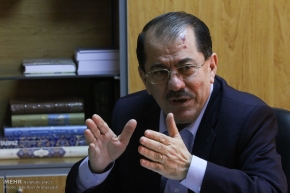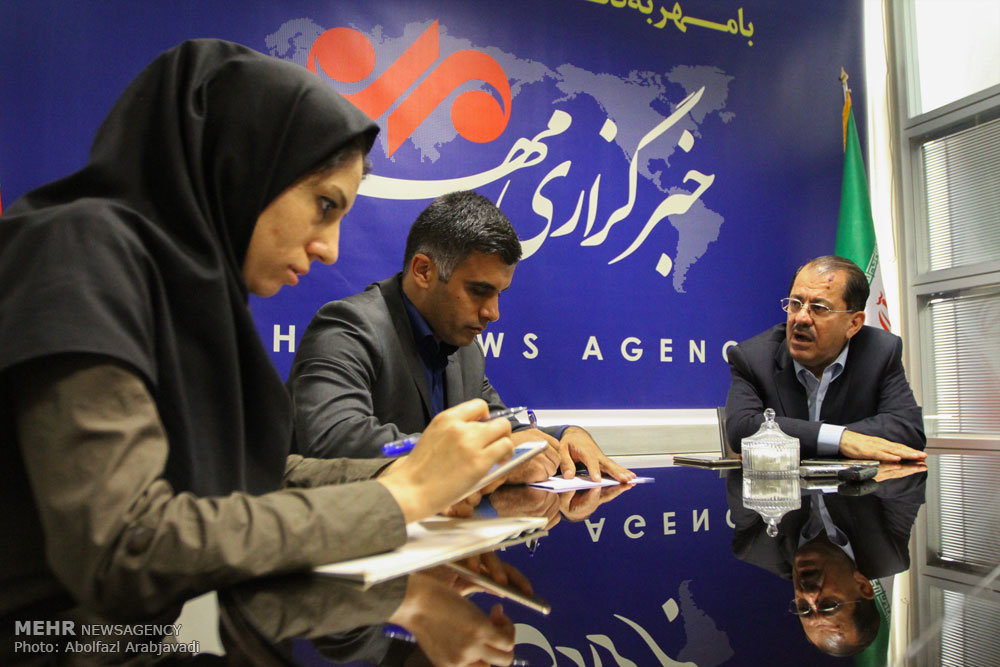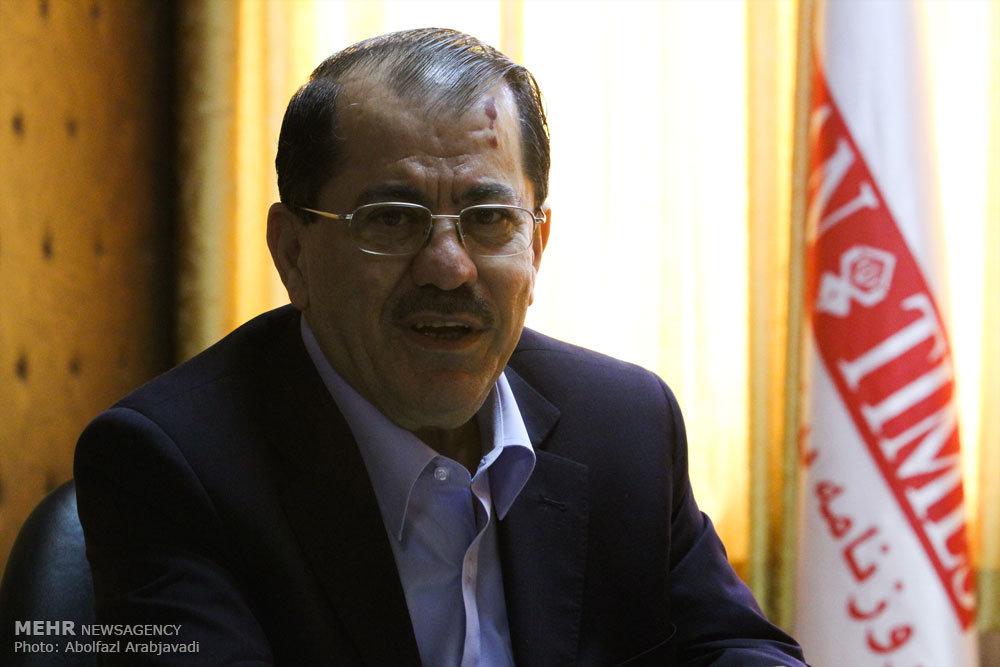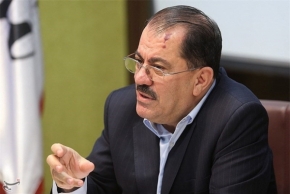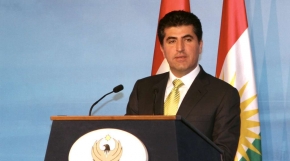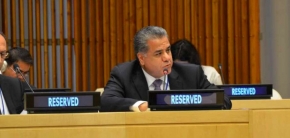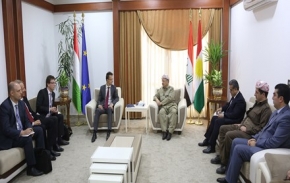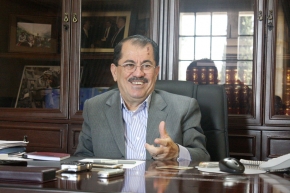Nazem Dabbagh, the representative of Kurdistan Regional Government (KRG), while visiting Mehr News Agency and offering congratulations on the occasion of inauguration of Kurdish Language Service of this News Agency, had an interview of which main points follow:
About the current situation of the relations between Iran and I.R. of Iran, Mr. Dabbagh was asked and he replied: I.R. of Iran is close to Iraq and has a close relation with this country and Kurds in special. Pointing the common features between two countries in cultural, political, economic and social fields, Dabbagh said relations of both sides at current situation is desirable. He added he tries to improve the exchanges mutual cooperations in all parts in especially economy and trade.
In a response to another question, Nazem Dabbagh considered the infrastructural concern in the fields of border terminals as the most important but political-security relations as desirable. He said after the Islamic Revolution’s victories Iran has been a friend for Iraqi Kurds and specifically supported them when having been chemically bombarded and attacked by ISIS.
About the differences relating the presidency of Kurdistan Region of Iraq among parties and Kurdish groups he said: the issue of oppositions in the Region has to be managed so that it cannot damage public properties. He added: in spite of holding such oppositions it can be solved only through talking. Dabbagh said: it is absolutely not nice to improperly treat great men like Masoud Barezani who has a long fighting record.
About rumors concerning Iran’s role to reinstate Barezani, he stated after this accident different boards of Iran visited the authorities and officials but they never said anything about staying and going of anyone, they instead tried to preserve unity in the Region. He continued that in the days ahead a team under Me. Ghasem Rostami will travel to the Region to talk over how to manage financial concerns and economic crisis of the Region.
In a response to question Dabbagh said: about the difference with the central government of Iraq, according to the constitutions the central government has responsibility for the Kurdistan Region that unfortunately some parts of these promises have not been carries out, that is why the Region gets into problems in specially budget and financial concerns being supposed to be solved through talking. Dabbagh suggested the salary of Peshmerga and oil as the most important aspects of these differences.
Nazem Dabbagh, the representative of KRG in Iran, taking with international reporter of Mersaad News Transmission about Baghdad which has asked Moscow to present in Iraq to fight against ISIS, stated: fighting against ISIS for KRG is a priority over everything, since ISIS is the enemy of humanity and civilization, not merely the enemy of a group or special people. He added: since the heading of our jobs is to wipe out ISIS, we welcome any government to enter on fighting it.

Dabbagh said: now Pishmerga are cooperating with Iraqi army to remove ISIS, for we know ISIS as a national concern. The representative of KR of Iraq in Iran stated: if the policy of the government of Iraq is enter Russia or any other force on fighting ISIS, we agree with this and Pishmerga will also fight against ISIS along with them.
The Prime Minister of KRG of Iraq, stating the constructive of role of Iran in solving regional and Kurdistan crises as effective, said: Iran tried to get all interior groups of Kurdistan together.
According to the report of Mehr reporter, Nechirvan Barezani the prime Minister of KRG of Iraq in the primary meeting of CGM held in studies office of Ministry of Foreign Affairs in Tehran, among reporters while stating that there are political disputes in Kurdistan Region and luckily these disputes have not grown said: these disputes can be solved through talking and we also aim to agree with all groups specially patriotic unity and we hope to reach a conclusion.
In a reply to a question about the role of Iran to fight terrorism he answered: the role of Iran was effective in two stages to solve the crises in the region. At first stage when ISIS attacked Kurdistan of Iraq, Iran was one of those countries helping us. After that also the role of Iran was constructive in Kurdistan political changes. Barezani added: the role of Iran in Kurdistan was constructive for it could get closer the interior groups of Kurdistan together.
He went on: we consider any changes aiming to destroy ISIS in the region positive. So we think in Syria changes cannot be military, concerns should be solves through a political process.
The P.M of KRG insisted: we think if any measure is taken to weaken terrorist in the region, it will be welcomed by us. If this quadruple correlation is going to collapse terrorist and ISIS, it will definitely be deemed as positive act in our view.
According to the report by foreign political reporter of ISNA News Agency Nechiravan Barezani presented in primary meetings of Munich Security Conference and said: political quarrels in Kurdistan Region occur, however, we are glad to say that it has lead no more quarrels and it can be solved. He added: we are negotiating with political groups, especially patriotic union and hope to reach an agreement.
The P.M of Kurdistan Region of Iraq in a response to question concerning the opening on the behalf of some in Kurdistan Region about Iran’s negative role answered: in my view it was absolutely wrong and Iran’s role at the time ISIS’a attack was so positive and Iran was one of those countries rushed to help us and we have always been witnessing Iran’s constructive role.
Kurdistan Region President Masoud Barzani welcomed Hungarian Foreign Minister Péter Szijjártó today. In a meeting between the two held in the city of Duhok, the President and the Hungarian Foreign Minister discussed the plight of internally displaced people and refuges in Kurdistan, and migrants and refugees heading to Europe from the region. The also discussed the efforts to defeat ISIS terrorists, and Hungarian contribution to this campaign.
The Hungarian Foreign Minister reiterated his country’s support to Kurdistan peshmerga forces with providing military assistance and training.
President Barzani thanked Hungary for its support to the peshmerga forces. On the refugee and migrant crisis, the President said that the root causes of this issue must be addressed. He said the threat of terrorism and economic challenges are two of the main causes forcing people to leave their countries.
On the fight against ISIS, President Barzani said the bulk of this fighting on the ground is on the shoulders of the peshmerga forces, adding that the world has yet to face this threat in a serious way.
New York, USA (dfr.gov.krd) - In New York this week, Minister Falah Mustafa Bakir, Head of the Department of Foreign Relations, discussed Kurdistan Region's urgent need for basic humanitarian needs at a meeting with Manuel Sager, State Secretary and Director General of the Swiss Agency for Development and Cooperation.
Minister Bakir gave a detailed account of the current situation in the Kurdistan Region, focusing on the latest humanitarian, economic, political developments and the ongoing fight against the terrorists of ISIS.
The Head of Foreign Relations highlighted the financial hardships that the KRG is facing due to the drop in oil prices, the impact of 1.8 million Iraqi displaced people and Syrian refugees on the Region’s stretched resources.
Minister Bakir called for continued international support for Kurdistan in humanitarian, political and military spheres and shed light on the KRG’s efforts to gather international support to recognize the genocide that the Yezidis suffered at the hands of ISIS.
Mr Sager said that the Kurdistan Region has friends in the international community and appreciated the KRG’s open-door policy for the displaced and refugees.
He reiterated Switzerland’s support for Kurdistan on the humanitarian field, especially through UN agencies and the International Committee of the Red Cross.
Minister Bakir and Secretary Sager agreed on continued communication and cooperation between both sides.
New York, USA (dfr.gov.krd) - A Kurdistan Regional Government delegation was in New York this week during the United Nations 70th General Assembly to highlight the ongoing fight against ISIS and the humanitarian and economic challenges facing Kurdistan.
The delegation was led by Minister Falah Mustafa Bakir, Head of the Department of Foreign Relations. The KRG's Representative to the United States, Bayan Sami Abdul Rahman, accompanied the minister, along with Assistant Head of the DFR Siham Mamand and Advisor at the DFR Rawand Darwesh.
They met ministers and senior officials of various countries, representatives of the UN, the media and other organisations to update them on recent developments and to urge them to support the UN's call for more funds to help the displaced people who fled ISIS and are sheltering in Kurdistan and other parts of Iraq. The Kurdistan Region is sheltering 1.8million displaced Iraqis and Syrian refugees. This, combined with the fall in oil prices and the costly war against ISIS, are impacting services to the host and refugee communities and hampering Kurdistan’s vibrant economy.
The delegation also called for an investigation into the horrific events of last year in which the Yezidis and other minorities were targeted by ISIS terrorists in what amounts to genocide.
Minister Bakir spoke at a high level meeting at the UN urging friendly nations to do more to support Kurdistan with the humanitarian crisis.
Minister Bakir told the meeting, 'We support the efforts of the United Nation and the international NGOs working with us but indeed we need to do more in order to provide food, shelter and education in order to give them (the displaced) hope, otherwise this will be very difficult for us to cope with,” he said.
The KRG Minister made this intervention at a special UN session that focused on the humanitarian situation and its broader impact on Iraq. Leading the event, Sarah Sewall, US Undersecretary of State for Civilian Security, Democracy and Human Rights, outlined the threat to the displaced because the UN has struggled to raise the funds needed to continue its humanitarian programmes in Kurdistan and the rest of Iraq.
As she appealed to the international community to fund the UN’s programmes, Ms Sewall announced that the United States will contribute an additional $56m in humanitarian assistance for Iraq, bringing the US’s total contribution to Iraq, including Kurdistan, to $540m since start of fiscal 2014.
Several speakers praised the government of Iraq, the KRG and the people of Kurdistan for their compassion towards the displaced population. Iraq's Minister for Displacement and Migration Jasim Al-Jaf. Made a keynote speech at the which was attended by the representatives of several international organisations as well as diplomats.
Kurdistan Region President Masoud Barzani welcomed Hungarian Foreign Minister Péter Szijjártó today. In a meeting between the two held in the city of Duhok, the President and the Hungarian Foreign Minister discussed the plight of internally displaced people and refuges in Kurdistan, and migrants and refugees heading to Europe from the region. The also discussed the efforts to defeat ISIS terrorists, and Hungarian contribution to this campaign.
The Hungarian Foreign Minister reiterated his country’s support to Kurdistan peshmerga forces with providing military assistance and training.
President Barzani thanked Hungary for its support to the peshmerga forces. On the refugee and migrant crisis, the President said that the root causes of this issue must be addressed. He said the threat of terrorism and economic challenges are two of the main causes forcing people to leave their countries.
On the fight against ISIS, President Barzani said the bulk of this fighting on the ground is on the shoulders of the peshmerga forces, adding that the world has yet to face this threat in a serious way.
Nazem Dabbagh the representative of Kurdistan Region of Iraq in Iran in talk with the reporter of International Service of Iranian Students News Agency (ISNA) dealt with the present challenges of the relationship between Kurdistan and central government, of the fight with ISIS, of the way to control crises and of Kurdistan’s relations with Iran and Turkey whose outlines as followed:
He does not consider Iranians and Kurds as two separate nations and believes that the cultural and historical similarities have caused Kurds of Iraq have continually deemed Iranians as a part of their own. Dabbagh said: thousands of workforces now are in Kurdistan helping to improve there. In the Region we know Iranians of our own. In Kurds’ view Iranian citizens in the Region are recognized than other foreigners. We call them Iranian but others foreigners. When you travel to Kurdistan, you most often feel that you are in Iran as a result of lots of cultural similarities of both.
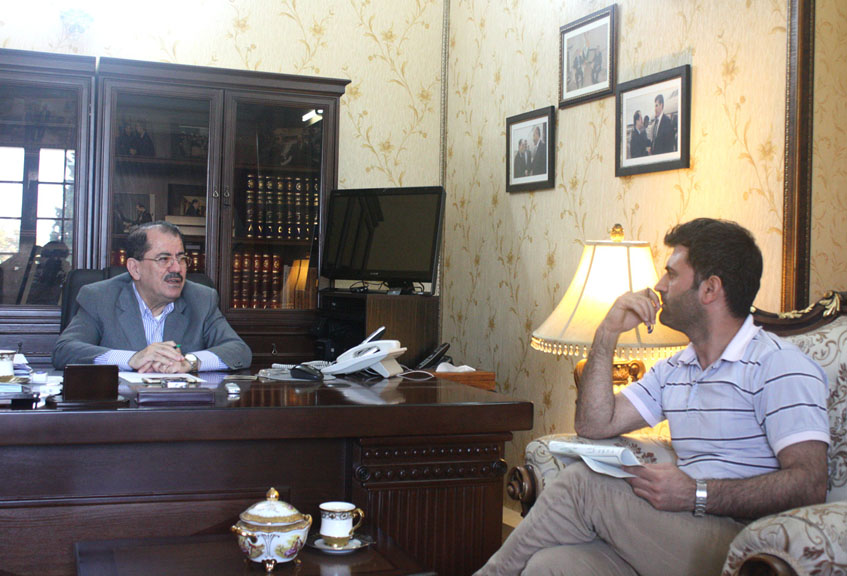
It has been said some of anti-revolution Kurdish cells now present in Kurdistan of Iraq and even are busy trying works, Nazem Dabbagh stated: this is known by Iranian government and these cells, according to present agreements, are not allowed to make any effort against Iran’s interests.
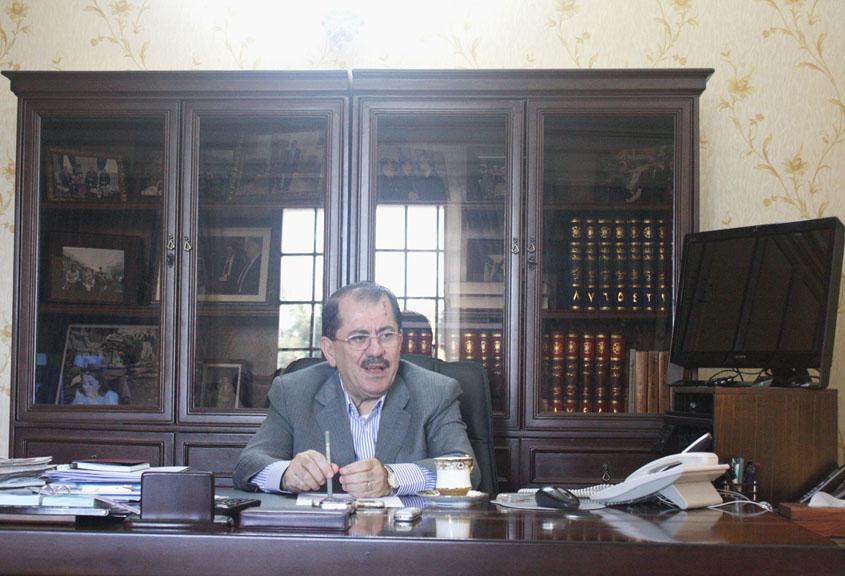
Denying any relations with Israel, Dabbagh said: no documents relating this has not given to Kurdistan Region so far. Some are following to create deep differences between us and Iran and through putting such things. They are seeking their aims but we as the representative of the Region in Iran have not heard even once such matter on the behalf of our authorities in any official meetings but just in few News Agencies, he added. Our relations with Israel are according to the constitution of Iraq, Does anyone believe that Kurdish are following to cause problems with Arabian nations and Iran for Israel!?
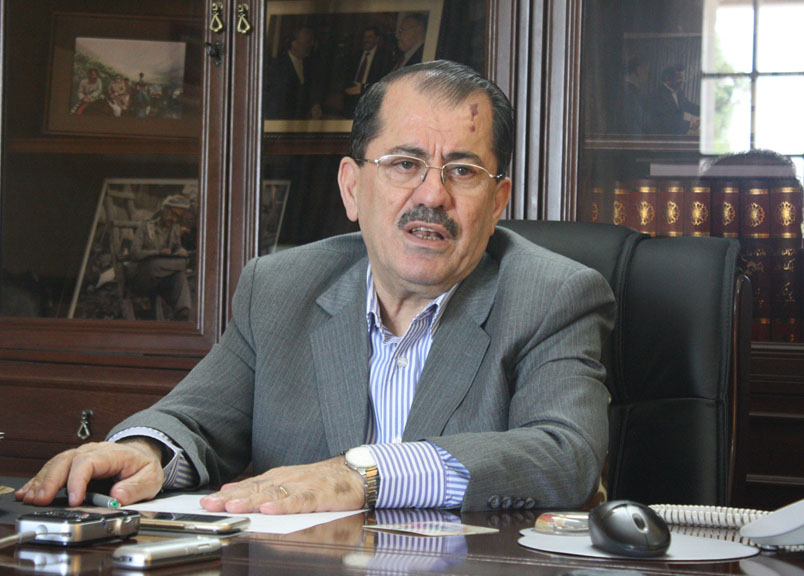
Concerning with important problem of “the independence of Kurds” being considered a vital security concern for neighbors, Iran in special, Nazem Dabbagh also stated: the matter of Independence of Kurds and of having an independent country is not only being put among Kurdish leaders but it also is all Kurds’ heartfelt desire from all over the world; however, desiring independence differentiate from declaring it. Declaring independence requires its special conditions and in my view it is not now prepared.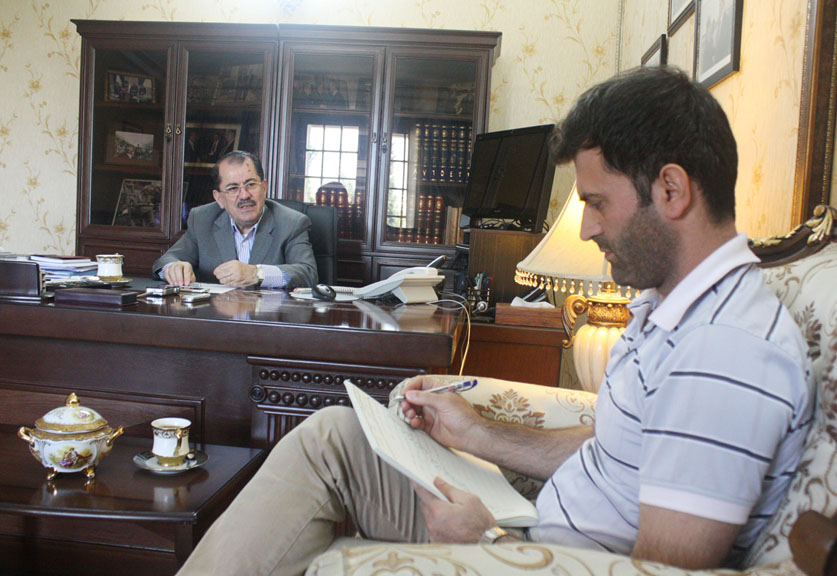
Relating the difference between Kurdistan Regional Government and Central Government of Iraq, Dabbagh said: in the past to cut the budget of the Region on the behalf of the Central Government caused Kurds to begin selling oil, aside from its being legal or not. There were not any other ideas. We are selling our oil and have come to an agreement, early in following Christian year, to do this with Central Government’s cooperation. It also pays us the money of sold oil; in spite of exporting oil according to the agreement with federal government, Baghdad denied to pay it us. These problems can be solved. We, monthly, sell $800 million oil and this earning was deposited to government’s treasury; however we have never been paid more than $400 million.
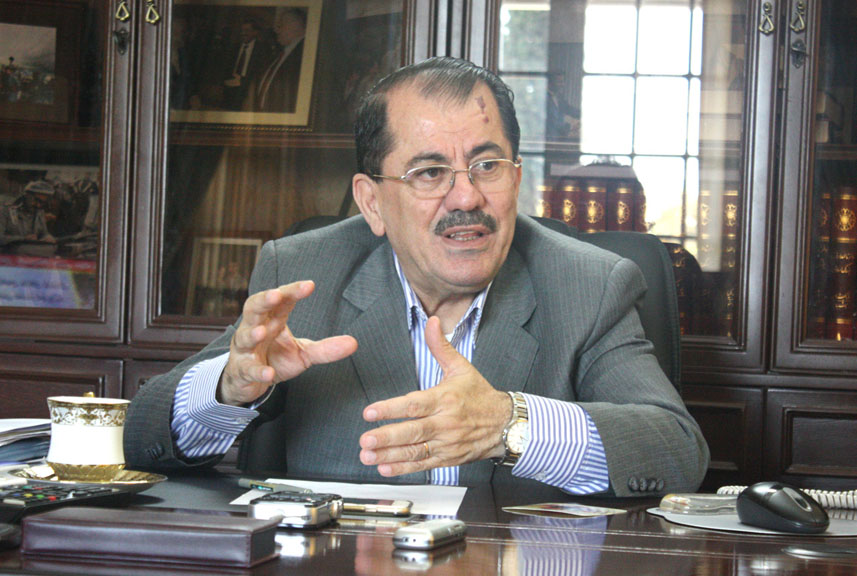
Dabbagh added: Pishmegas are one of the important forces fighting against ISIS now strongly defending the Region as a part of Iraq. They were fighting across Iraq, though. Pishmergas have many times fought in Basra, Karbala, Najaf, Baghdad and other regions in Iraq. Central government can make use of Pishmergas’ high ability, why did not Maliki (the former Prime Minister of Iraq) take advantage of Pishmergas to support Mosul?
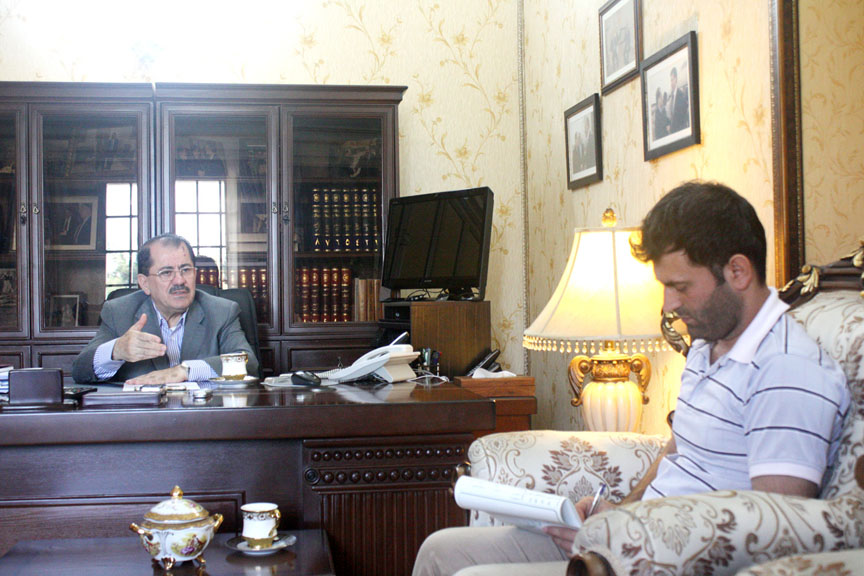
The head of Kurdistan Regional Representative Office added: our differences with central government are how to perform the constitution. But now we along with forces have practically released the regions in dispute occupied by ISIS. If there were not Pishmerga, the same regions were under ISIS’s control. Now the matter is to put the released zones in dispute go into the frame of constitution.
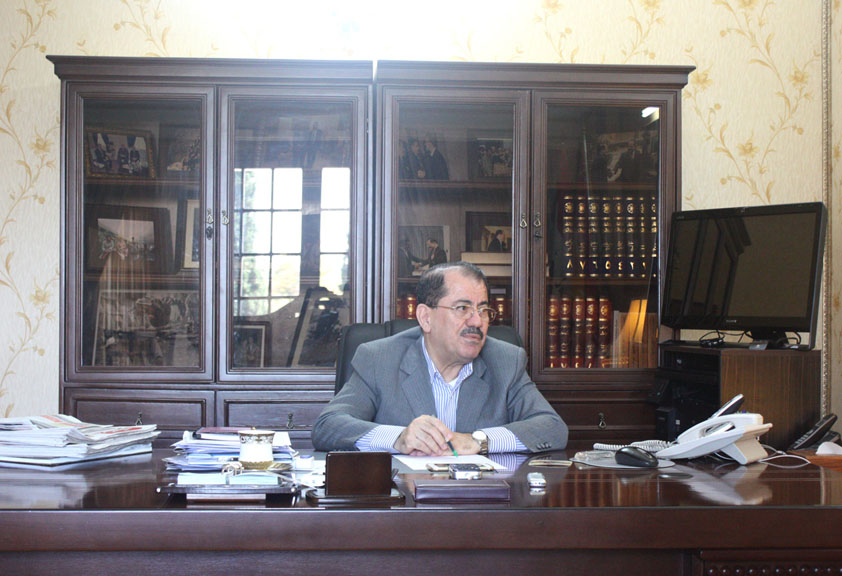
In another part of his phrasing as denying any rift among Kurds and confronting ISIS Dabbagh said: all Kurds including Pishmerga of the Region, P.K.K and Syrian Kurds in fight with ISIS are unified, and this unification strength 1050 km of battlefield with ISIS. There may be differences but just on little problems and military tactics. Kurds have not got basic differences about this.
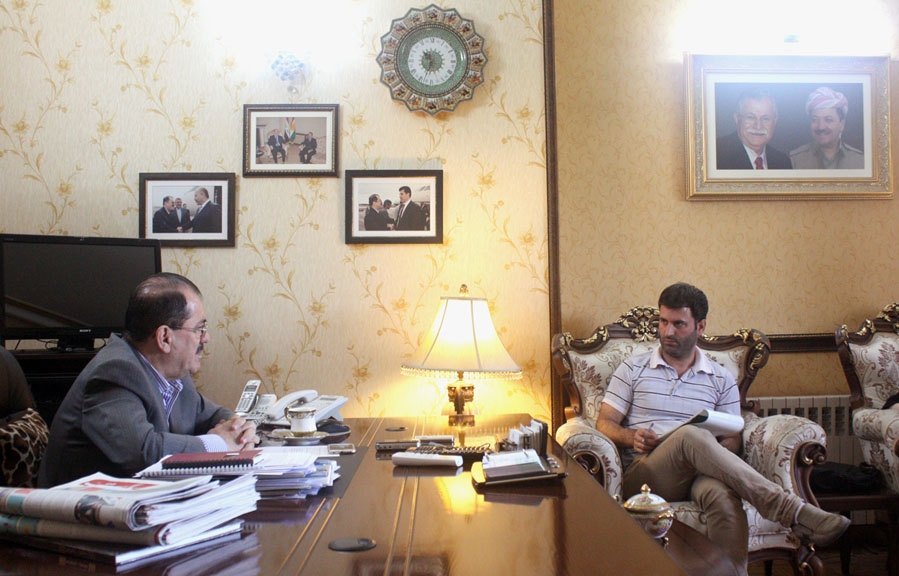
Dabbagh was asked for Turkey’s strike to the North of Syria and providing a safe zone, he replied: every country has to respect others’ laws. To create such safe zone refers to international rules whether it is allowed to do or not. If such act leads to prevent blooding and massacring non-armies, it is acceptable. However it is just not over Turkey but international societies to come up with decision and also it refers a bit to interior affairs of Syria.
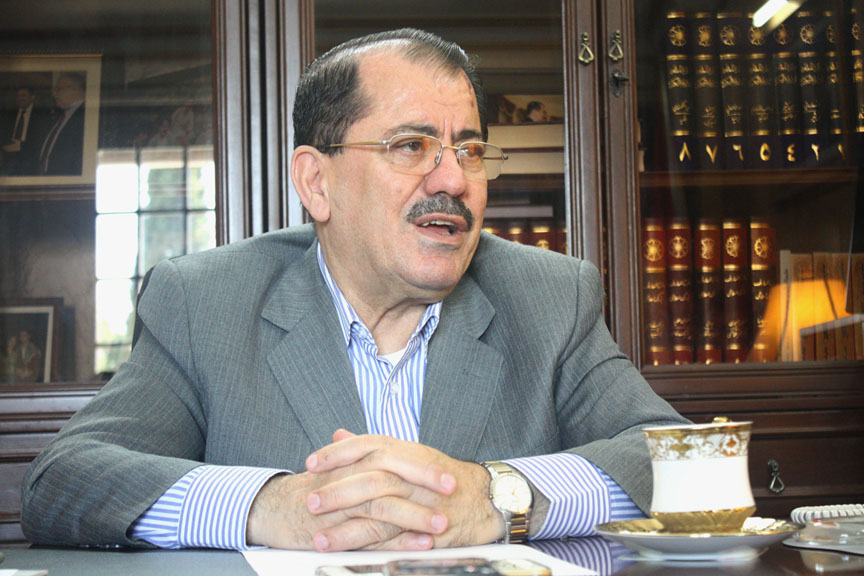
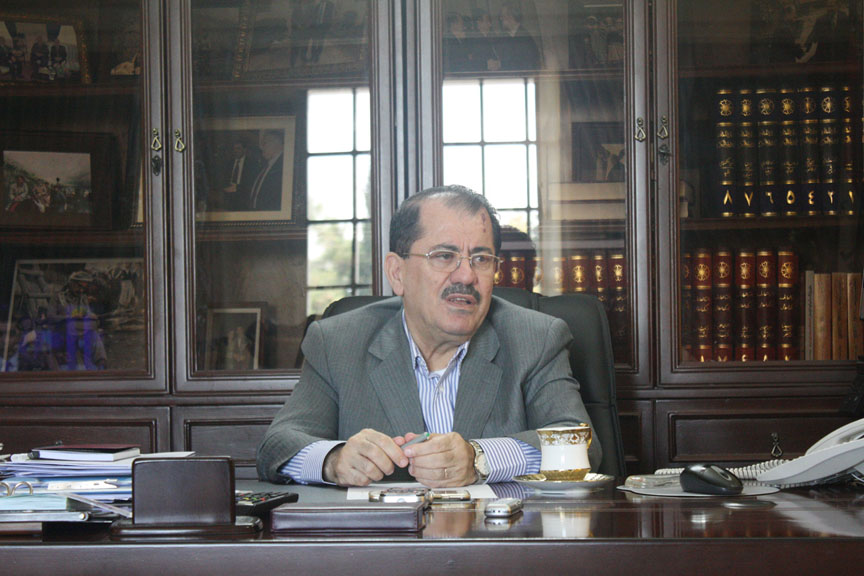
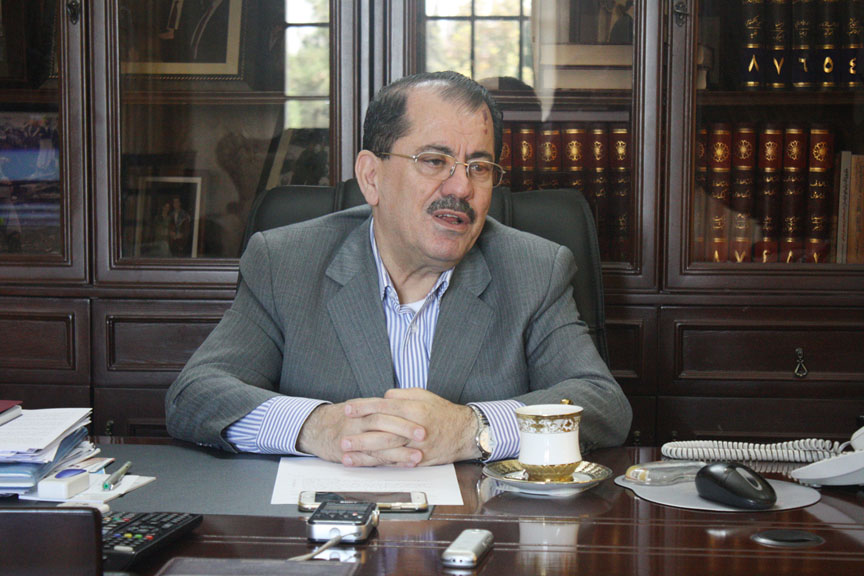
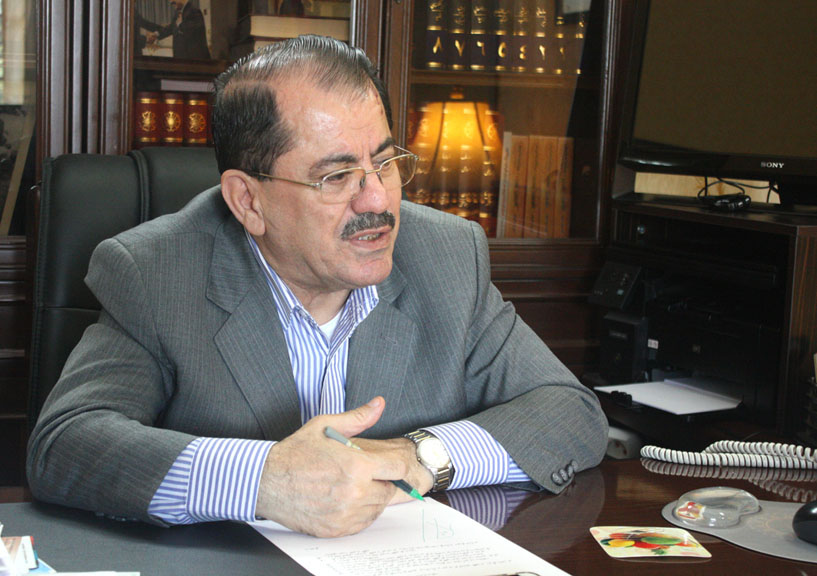
Latest News
- President Nechirvan Barzani visits Iranian Consulate General to pay respects to victims of Kerman terrorist attack
- President Nechirvan Barzani receives outgoing French Ambassador
- President Nechirvan Barzani condemns terrorist bombings in Iran
- President Nechirvan Barzani meets with US Deputy Secretary of State
- President Nechirvan Barzani’s New Year Address
- KRG Prime Minister Meets with US Deputy Secretary of State
- KRG Prime Minister Engages in Key Talks with UNAMI Chief
- KRG Prime Minister Hosts Diplomats from Iraq and Kurdistan Region
- KRG Prime Minister Meets with the UN’s Secretary-General at COP28
- President Nechirvan Barzani meets with Turkish Ambassador
- KRG Prime Minister Welcomes UK Military Delegation
- President Nechirvan Barzani meets with UK Chief of the Defense Staff’s Senior Middle East Advisor
- KRG Prime Minister Discusses Regional Issues and Domestic Policies in Special Panel
- KRG Prime Minister Meets with Former British Prime Minister
- MEPS Forum in Duhok Highlights Climate Change Among Key Global Challenges
- KRG Prime Minister Meets with United Nations Delegation
- President Nechirvan Barzani and French Ambassador discuss the situation in Iraq and the region
- President Nechirvan Barzani meets with Head of the Independent Strategic Review of UNAMI
- KRG Prime Minister Inaugurates 5th International Trade Fair for Industry and Construction
- KRG Prime Minister Meets Qatar's Consul General
- President Nechirvan Barzani meets with Iraq’s Oil Minister
- KRG Prime Minister Welcomes Cardinal Sako of the Chaldean Catholic Church
- KRG Prime Minister Meets with Iraq's Energy Officials
- KRG Prime Minister Meets with British Ambassador
- President Nechirvan Barzani meets with UK Ambassador to Iraq
- KRG Prime Minister Welcomes Iraq’s Federal Prime Minister
- President Nechirvan Barzani meets with Prime Minister Mohammed Shia Al-Sudani
- KRG Prime Minister Welcomes Al-Ittihad Sports Club
- President Nechirvan Barzani at Paris press conference: Iraq should not be drawn into regional conflicts
- President Nechirvan Barzani and President Emmanuel Macron hold wide-ranging discussion on Iraq and the region

